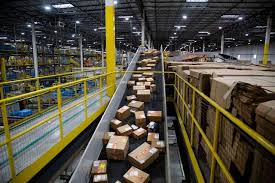The latest evidence of how concentrated the business of keeping the internet operating has become was a significant outage in Amazon’s cloud computing network on Tuesday, which badly affected services at a wide range of U.S. corporations for more than five hours.
The Amazon Web Services outage mostly impacted the eastern United States, but it also impacted everything from airline reservations and car dealerships to payment apps and video streaming services, as well as Amazon’s vast e-commerce operation.
Amazon has yet to reveal what exactly went wrong. In fact, Amazon’s Tuesday communications were limited to terse technical explanations on an AWS dashboard and a brief statement delivered by spokesperson Richard Rocha that acknowledged the outage had impacted Amazon’s own warehouse and delivery operation but stated that the company was working to resolve the issue.
The business claimed in a message on the AWS status page that it has “mitigated” the underlying problem that caused the outage, which it did not define, around five hours after multiple companies and other groups began reporting troubles. It took some of the affected businesses several hours longer to thoroughly examine their systems and relaunch their own services.
Amazon Web Services was formerly led by Andy Jassy, who took over from founder Jeff Bezos in July. Amazon’s cloud-services business is a big profit center. According to Synergy Research, it controls about a third of the $152 billion cloud services market, a higher stake than its closest competitors, Microsoft and Google combined.
According to Carl Malamud, a technologist and public data access activist, the AWS outage demonstrates how Big Tech has distorted the internet, which was created as a distributed and decentralized network to withstand mass tragedies, such as a nuclear strike.
“We’re violating that fundamental notion when we put everything in one place, whether it’s Amazon’s cloud or Facebook’s monolith,” said Malamud, who created the internet’s first radio station and later put a critical US Securities and Exchange Commission database online. “We saw that when Facebook became the vehicle for a major disinformation effort, and we’re seeing it again today with Amazon’s failure.”
Single-point failures appear to be becoming more common, causing widespread and often lengthy outages. The behind-the-scenes content distributor launched in June. Fast had a breakdown that brought down dozens of prominent internet sites, including CNN, The New York Times, and the UK government’s home page, for a brief while.
Then, in October, Facebook — now known as Meta Platforms — blamed an “erroneous configuration modification” for the hours-long global outage that also affected Instagram and WhatsApp.
According to Doug Madory, director of internet monitoring at Kentik Inc, a network intelligence organization, issues started mid-morning on the US East Coast this time. One of the most well-known names affected was Netflix, which suffered a 26 percent decline in traffic according to Kentik.
Customers attempting to book or change flights with Delta Air Lines were unable to do so. Delta representative Morgan Durrant said, “Delta is working fast to restore functionality to our AWS-supported phone lines.” Customers should instead utilize the airline’s website or mobile app, according to the company.
After some airport-based systems were disrupted by the outage, Dallas-based Southwest Airlines claimed it shifted to West Coast servers. More than three hours after the disruptions began; customers were still reporting them to DownDetector, a prominent clearinghouse for user outage complaints. Flights were not disrupted much, according to Southwest spokesperson Brian Parrish.
According to Toyota spokesman Scott Vazin, the company’s U.S. East Region’s dealer services have decreased. Inventory data, monthly payment calculators, service bulletins, and other stuff are all accessible through the company’s apps. There were over 20 apps that were affected.
People trying to use Instacart, Venmo, Kindle, Roku, and Disney+ also experienced troubles, according to DownDetector. McDonald’s’ app was also unavailable. American, United, Alaska, and JetBlue, on the other hand, were untouched.
Madory stated that there was no basis to infer criminal behavior. According to him, the current string of severe outages demonstrates how complicated the networking industry has gotten. “These disruptions are becoming more and more the result of automation and centralization of administration,” he said. “As a result of the operational complexity, this leads to outages that are difficult to totally avoid but have a significant impact when they occur.”
It was unclear whether the outage was affecting the federal government or how it was affecting it. In an email response to inquiries, the US Cybersecurity and Infrastructure Security Agency said it was working with Amazon “to assess any potential consequences this outage may have for federal agencies or other partners.”

















